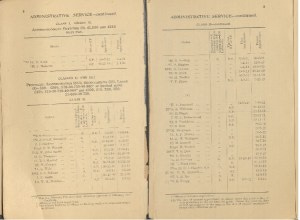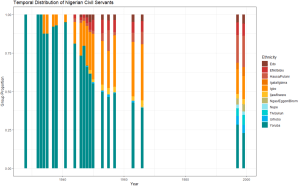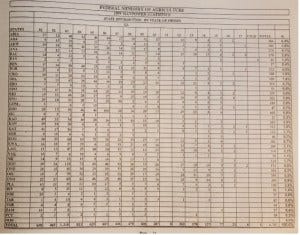Historical Origins of Ethnic Representation in the Nigerian Bureaucracy
By Ada Johnson-Kanu
(Photo: Nigerian civil servants taking a break from work at the civil service head quarters in Abuja. Source: author.)
Private firms, hospitals, governments, and even universities are actively increasing the level of representation of ethnic and racial groups in their employ. The benefit of increased diversity is highly extolled. A large body of scholarship suggests that group representation in the bureaucracy has important consequences for public goods provision and accountability, corruption, and maintaining regime stability. But why do some ethnic groups in contemporary Africa have better bureaucratic representation than do others? Rarely is bureaucratic representation endogenized and studied as an outcome we need to understand.
In my recent research, I argue that colonial-era access to the bureaucracy explains post-colonial representation within the bureaucracy. First entrants into the bureaucracy had no incentive to relinquish their advantage and hired almost exclusively from within their ethnic networks to maintain their position when they had the power to do so, leading to persistent representational advantages over time. Using data on the composition of bureaucrats in the Nigerian Federal Civil Service spanning nearly a century, I show that obtaining employment in the civil service early during the colonial period predicts the level of representation of an ethnic group in the civil service in the post-colonial period. This effect persists even when post-colonial civil service reforms, regime changes, and other political events are accounted for. I suggest that more deliberate policy to encourage education and diversity in the employment of civil servants may be necessary to curtail this first mover advantage of early civil service representation.
As ethnic groups gain employment in the Bureaucracy, they employ their co-ethnics when they get the power to make employment decisions. Since bureaucrats are given autonomy, and allowed to make and execute policy, indigenous bureaucrats would create employment opportunities for their co-ethnics. Government jobs in colonial and post-colonial Nigeria were stable, well paid, and respected occupations in society. Therefore, those who attained such positions would be reluctant to quit such positions. Ricart-Huguet (2020) argues that bureaucrats were most likely to become politicians and cabinet ministers in the post-colonial period. Therefore, colonial bureaucrats may have recognized the strategic positions they occupied and worked towards obtaining future political positions on behalf of their ethnic group.
To understand how indigenous ethnic groups first attained positions in the colonial Bureaucracy, we need to understand the requirements for employment in the service, and the political terrain the colonized found themselves in during colonial rule. For employment in the colonial bureaucracy, individuals needed to have at least a secondary level education. This is because the duties were conducted in the language of the colonial power (English), and official documents usually contained advanced concepts and vocabulary that the indigenes could only grasp after attaining a certain level of education. In Nigeria, the colonial officials were reluctant to employ local Nigerians and only made exceptions for educated Nigerians. Different factors affected exposure to Western education across ethnic groups during the colonial period. The presence of precolonial bureaucratic structures allows for the low-cost dissemination of western style education. This is not the case if these structures are already in use to provide nonwestern style education. Elite bargaining with Europeans is also important for investment in education for the local population.
Prior to 1945, it was difficult for Nigerians to obtain senior positions in the Nigerian Colonial Civil Service In fact, the British deliberately excluded them from these positions despite their qualifications. They might have done so to prevent Nigerians from mobilizing within the civil service, and work against the policy aims of the colonial government. At that time, the colonial government’s agenda differed from Nigerians’ agenda for economic development and liberation. British colonial development projects consisted of building railways, and roads to facilitate the production of, and export of cash crops. Lagos was a major port, and improving exports meant investing in sea transport and road networks that would connect the cash crop areas to the port for easy transportation out and receipts of foreign exchange.
After the second World War, many British civil servants in Nigeria were deployed back to Britain As a result, Nigerians were allowed into the civil service at higher rates, albeit in junior positions. Nigerian politicians and elites, pushed for the “Nigerianization” of the civil service to bring an end to colonial rule in the country. The mass exodus of European civil servants pre- and post-independence allowed represented ethnic groups in the civil service to increase their numbers. This also created space for the inclusion of other ethnic groups that were previously under or unrepresented in the service.

In my research, I collect civil service staff lists from the Southern Nigeria Protectorate for the years 1906, 1907, and 1909 gotten through the University of California library in microfiche form. These data are used to infer the number of Nigerian civil servants in the civil service before and just after amalgamation in 1914. I also collect data from the Nigeria National Archives in Kaduna. The Archives keep staff lists of all Federal civil servants. For the staff list 1928 to 1966, I assemble a list of all civil servants from these lists. Combined, the lists contain about 55,000 entries. Of this number, 12,000 are Nigerians. With the help of four research assistants, I code the ethnic groups each of these civil servants belong to. For each name, each research assistant coded the ethnic group they believe – based on their experience as Nigerians – the names belong to. There are many ethnic and language groups in Nigeria. Colloquially, Nigerians argue that there are over 200 language groups. However, based on Murdock’s maps on historical ethnic homelands, there are just over 100 ethnic groups in Nigeria. The data is mapped unto ethnic level data by matching ethnic groups to their ancestral geographical locations. The Federal Character Commission has compiled data on the level of representation of each state in all departments of the civil service. The commission published the Manpower statistics which are available from 1996, to 1999. I use data from 1997 and 1999 since they contain information for all agencies in the civil service, while the other two years only collect a subset of this data for agencies under the ministries.


Descriptive statistics and graphs show that in 1928, Europeans were the largest proportion of civil servants in the country. In fact, majority of colonial civil servants were British up until the 1940s when world events necessitated the deliberate incorporation of Nigerians into the service. Post-independence in 1963, we can see that the population of British civil servants had reduced by more than half. At independence in 1960, many of the British in Nigeria chose to return to their country. Among Nigerian civil servants, the Yorubas made up the largest ethnic group in the entire civil service until the post-colonial era. In fact, the Yorubas were the first ethnic group to attain positions in the colonial civil service. The second ethnic group to enter the civil service appears to be the Igbos in the 1930s. By the mid-1940s, more Nigerian groups gained employment into the civil service. Despite all the new entrants into the civil service, the Yorubas still maintained the highest population in the civil service. The ethnic composition of the civil service did not only vary across time and various ministries, departments, and agencies in the civil service. For instance, in 1928, Yorubas were only ethnic group in the civil service. They were mainly in two Agencies – the Ministry of Health, and Lands and surveying. Employment in the civil service did not mean the ethnic group was in all agencies across the service.
Using simple OLS regressions, an unbalanced panel showing the levels of representation in the civil service for each Nigerian ethnic group for the period 1925 to 1966, I find that previous levels of ethnic representation within the civil service influence future levels of the representation. Those ethnic groups that had early representation in the colonial civil service were more likely to be overrepresented in the post-colonial civil service.
In ongoing work, I tease out the mechanisms behind the results discussed in this post. I adjudicate between two mechanisms to explain the results. Firstly, it could be that ethnic groups that obtained early entry also had better educational investments over time which made them more likely to be qualified for employment within the civil service. Thus, these groups have an oversupply of candidates for civil service jobs. On the other hand, it could be that regardless of their qualifications, these ethnic groups are in higher demand for civil service positions either because they do better on the job or because the civil service prefers their skills.
While we understand the consequences of bureaucratic representation, more work needs to be done to understand how this representation emerges. My research contributes to this line of inquiry for one country – Nigeria – with results which may be generalized to other countries with similar historical backgrounds and ethnic diversity. However, it will be interesting to learn of the historical development of representation in bureaucracies that do not share similar colonial history as the case studied here.

